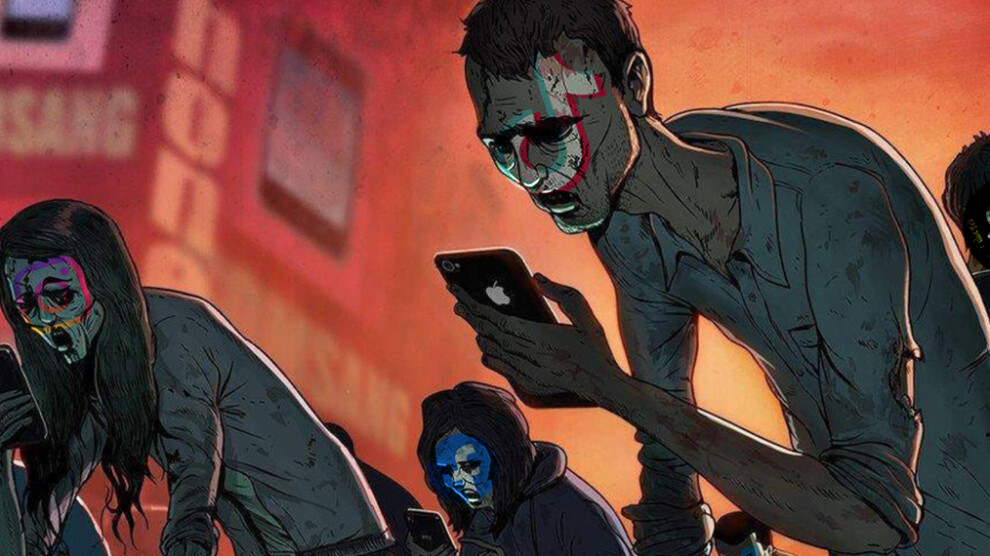Firaz Dağ wrote a feature for Nûçe Ciwan called 'Youth and the digital media of capitalist modernity'.
The text is as follows:
The exponential advancement of technology in recent decades has proven to be a real challenge to be understood by society. At the same time that important advances in the area of health and development have been made, it is becoming increasingly clear that these advances are at the service of capitalist modernity and its interests behind them. A medicine that can lead to the cure of a certain disease becomes accessible according to the market value and not because of the human need to overcome the disease. At the same time, technologies that a short time ago were considered a reflection of an elitist minority, are now widely accessed by people in an absurd consumerist way. Nowadays it’s hard to find a young person who doesn’t have a quality phone and who doesn’t use digital media on a daily basis… not to mention the various studies that point out that in the very near future, Artificial Intelligence will reach the human level . Furthermore, by 2026, around 2 billion users will be in the metaverse. But what does that mean anyway?
To begin to understand this whole process, which took place extremely quickly and generates conflicts of opinion between generations, it is necessary to stop and analyze important key points in order to draw a line of reasoning that is clear and cohesive with reality and that presents an alternative to this .
1. What is the purpose of Digital Media (Social Networks)?
2. How does it influence the daily life of society and the mindset of its users?
3. The phenomenon of ‘influencers’ and the new product of capitalism.
4. Artificial intelligence, algorithms, advertising and addiction.
5. Metaverse, social isolation, distancing from human nature and other consequences
6. Alternative?
WHAT IS THE PURPOSE OF DIGITAL MEDIA?
The first digital media – commonly called social networks (a name I refuse to use, because there is nothing social about it), began to emerge in the late 90s and early 2000s, with technological advances providing contact networks to from the internet. The most famous applications of this period were MSN – launched in 1995 and succeeded by the success of Orkut, which was launched in 2004. While MSN sought to create methods of direct contact between individuals, orkut provided a different experience, giving the opportunity to create communities of friends or themes of common interest, sharing your everyday moments and even playing on the platform. It was an explosion of users and a phenomenon among the youth of the time. However, it was with the emergence of facebook (launched that same year) and its “like” and “sharing” interactions that digital media would start to have another role in society and began to develop a mentality within society.
It was from the experience of Facebook and promptly followed by Instagram (launched in 2010) that the focus of digital media ceased to be properly a means of direct communication between physically distant people, to be a medium and platform to share their photos, reflections, videos, your day-to-day, etc. With the implementation of the option to react to published content, an almost natural reflection emerged, of people publishing seeking to please their followers and friends, in addition to inflating their egos from a virtual count generated by a virtual interaction – and the platforms and applications began to reorganize and restructure in this quest for attention, but I’ll talk about when to bring up the topic of algorithms.
HOW DIGITAL MEDIA INFLUENCES SOCIETY AND THE MINDSET OF ITS USERS
First, I think it’s important to make it clear that I didn’t study psychology or any other form of ‘ai’, which doesn’t make me a professional to approach the subject. However, there are several studies carried out and being carried out on the subject, by different sectors of positivist science that seek to understand the effects of digital media on society – especially on young people, and it is safe to say that using the term ‘user’ when referring to referring to users of these media is assertive, since the reactions generated in the human brain caused by digital media in its users, is extremely similar to the way in which cocaine affects the brain. A documentary shown by Netflix (a contradiction of capitalist modernity comes in, since Netflix also uses methods to entertain and keep its users’ attention) called “The Dlema of Social Media”, addresses precisely these effects of networks on youth and is composed of people who worked on developing the algorithms of these networks and were aware of what the consequences would be.
The documentary presents how we are manipulated to generate profits for large corporations, the impact that this invasion can have on our personal lives, how networks facilitate the spread of fake news, etc. The film’s website itself talks about the process that went into producing the work, but also has other interesting tabs; raises the dilemma itself by presenting information such as: a study of 5,000 people found that greater use of social media is correlated with self-reported declines in mental and physical health and life satisfaction; the number of countries with political disinformation campaigns on social media has doubled in the past two years; and 64% of people who joined extremist groups on Facebook did so because algorithms guided them there.
The big and biggest problem generated by digital media nowadays is based again on the fallacies created by capitalism and its dissuasion from the understanding of freedom. Young people who use digital media do so because they are surrounded by a reality in which not to do so would be unusual, in addition to the fact that they think that being actively on the net publishing and disseminating is a form of their freedom of expression and right, while who do not recognize the negative effects caused by these networks and how consuming their content shapes their perception of reality.
Yes, digital media could play a positive role in society if they were at the service of society’s interests and not the interests of corporations. The media has been ‘democratized’ to the point that anyone with a phone in their hands can publicize a fact that occurred at that moment, denounce police abuse, a corruption scheme, etc. However, we as a society have passed this point and are moving in the opposite direction, where reality and truth are molded and formed from the production and dissemination of lies repeated tirelessly on networks until they become reality. There are many examples…the 2016 US election, the 2018 election in Brazil, the existence of channels like Brasil Paralelo, etc.
It is imperative that we recognize that digital media are a tool of the system of capitalist modernity for the control and manipulation of youth and this has become increasingly clear over time. A youth occupied with futility, consumerism, ego, likes, celebrities, drugs, in short, an alienated and busy youth, fails to play its role as a youth of questioning, self-questioning, revolting against injustices and the practices of this system. They become vassals of the mentality to which they are naturally opposed.













